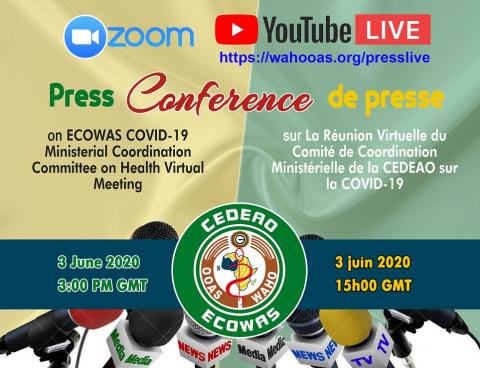
WAHO Holds a Press Conference on COVID-19 Ministerial Coordinating Committee on Health First Meeting
The Director General of the West African Health Organization, WAHO held a press conference on Wednesday 3 June 2020 to:
- update the media on the discussion held by the Ministers and Experts
- share the key decisions taken by the Ministers regarding the response to COVID-19 pandemic.
Below is the Press Release.
THE ECOWAS COVID-19 MINISTERIAL COORDINATING COMMITTEE ON HEALTH HELD THEIR FIRST MEETING
3 June 2020 – As a result of the Extraordinary Summit of the ECOWAS Authority of Heads of State and Government on 23 April 2020, which set up three Ministerial Coordination Committees on Health, Finance and Transport to support H.E. Muhammadu Buhari, President of the Federal Republic of Nigeria, the designated ECOWAS Covid-19 Champion, the Ministerial Coordinating Committee on Health comprising of all 15 ECOWAS Ministers of Health had its first meeting yesterday, 2 June 2020. This was a video-conference chaired by Dr Osagie EHANIRE, Honorable Minister of Health of the Federal Republic of Nigeria, with Prof Stanley OKOLO, Director General of West Africa Health Organization as co-chair.
Twelve (12) Ministers participated whilst three (3) were represented by another Minister, a Deputy Minister and a Permanent Secretary. In attendance were the President of the ECOWAS Commission; ECOWAS Commissioner for Infrastructure; ECOWAS Commissioner for Trade, Customs & Free Movement; and ECOWAS Commissioner for Macroeconomic Policy and Economic Research. The meeting was addressed by Dr Moeti, Regional Director of the World Health Organization (WHO) Africa Region, and Dr Nkengasong, Director of the Africa Centers for Disease Control and Prevention.
The Ministers were concerned that the epidemic continues to spread in the ECOWAS region, although the Member States are at different stages of evolution. They noted that 14 weeks into the pandemic in the region, 35,115 people had been confirmed Covid-19 positive, of whom 56% still had active infection, 42% had recovered and 2% had unfortunately lost their lives as art 1 June 2020. They observed that, despite the improved surveillance and increase in testing, only about 0.11% of the population had been tested to date.
The Ministers commended the ECOWAS Commission and WAHO for the technical and financial support to Member States in coordination, financial support, training of personnel, and provision of diagnostic test kits and critical medical supplies including personal protective equipment. They thanked WHO Africa Region, Africa CDC, and Jack Ma Foundation for their support and for donation of critical medical supplies, and expressed profound appreciation to donors and partners who have to date contributed significant funds to the costed ECOWAS regional response plan, particularly the African Development Bank (AfDB), the German Government (BMZ, KFW), European Union, and France (AFD).
The Ministers agreed to:
- Institute measures to mitigate the socioeconomic impact of the pandemic on the population
- Mobilize more resources to support national and regional Covid-19 response capacity
- Strengthen capacity for contact tracing, isolation & treatment
- Expand the health workforce through the use of community health workers, allied health professionals and healthcare students to assist in the public health response such as contact tracing and mitigate current shortages
- Decentralize testing, surveillance & case management to the districts with professionals and volunteers deployed to support local efforts
- Develop a cross-border surveillance & management strategy for use during epidemics, that may involve designated border crossings with enhanced surveillance facilities and data sharing platforms
- Prioritize inclusive, contextualized and targeted risk communication that promotes adherence to public health measures while taking account of the socioeconomic situation of the population.
- Strengthen disease surveillance and management for non COVID-19 diseases, especially through community engagement with traditional and religious leaders.
- Ensure data driven decisions are made, particularly when easing lockdown. Ministers agreed that the easing of lockdown which has already started in some Member States should be data-driven, adapted to local context, implemented gradually, and evaluated after a period of about two weeks to determine if lockdowns should be reapplied in the event of a resurgence in cases
- Acknowledge the emerging literature on the effects of chloroquine and hydroxychloroquine in Covid-19 patients which had necessitated suspension of the WHO clinical trial, and charge Member States that continue to use these drugs on a compassionate basis to carefully document patient response and any adverse effects
- Encourage the evaluation of potential benefits of traditional medicines in clinical trials, including the COVID Organic product, as is being done in some countries
The Ministers also reflected on sensitizing the public to the fact that Covid-19 infection may be around for some time even in countries where the pandemic has reduced or stabilized, considering that the current lockdowns cannot be applied indefinitely.
The Ministers tasked WAHO, to work with the Department for Trade, Customs & Free Movement at ECOWAS Commission, and the Ministerial Coordination Committee on Transport, to develop guidelines and standing operating procedures on regional cross-border movement, whether by air, land or sea, for consideration by the Ministers. These should cover the following areas:
- Essential products including medicines, agricultural, food products and petroleum; commercial goods for trade and business; and passenger movements
- Motor parks and loading areas for passengers and goods
- Border Posts or Entry points for international travel including air, land and sea ports
- Risk communication for travelers and handlers of goods.
- END -
